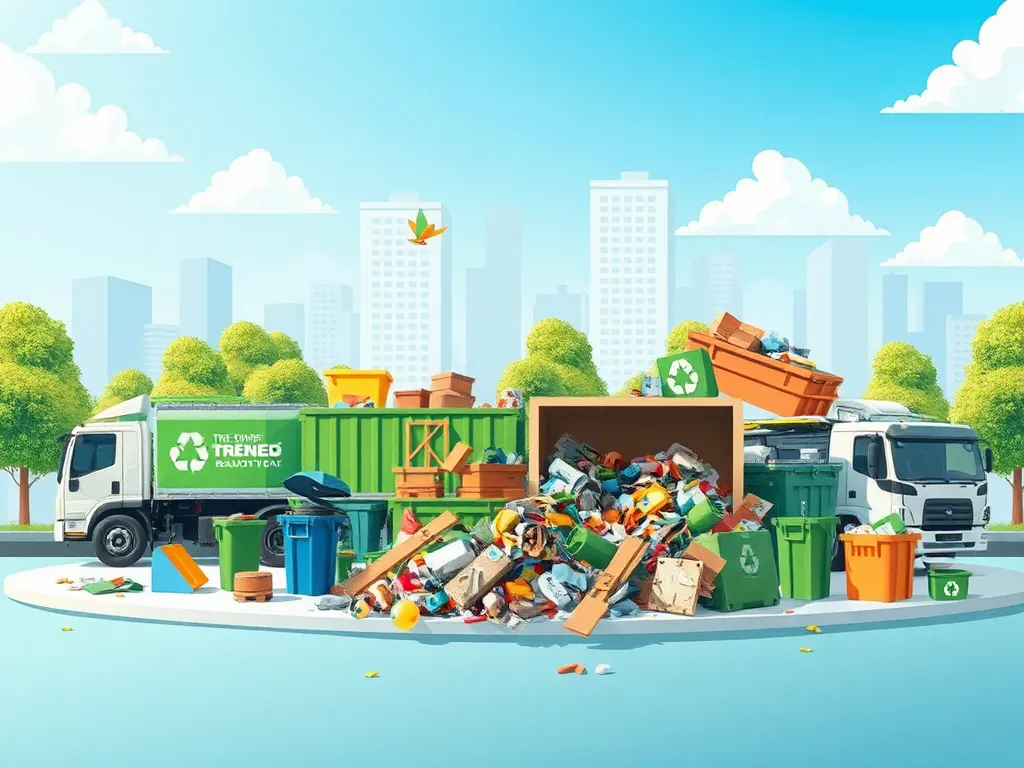Explore the Latest Trends in the Junk Removal Industry

Trends in the Junk Removal Industry
The junk removal industry has witnessed significant transformations in recent years, driven by evolving consumer preferences and environmental considerations. Trends in junk removal industry reveal a growing demand for eco-friendly practices, technological advancements, and innovative business models, all aimed at enhancing service efficiency and sustainability. Companies in this sector are now more focused on not just removing junk but also on ensuring environmentally responsible disposal methods, making it an integral part of their operational strategies.
One of the most notable trends in junk removal industry is the shift towards eco-friendly practices. As consumers become increasingly conscientious about their environmental footprint, there is a rising expectation for companies to adopt sustainable disposal methods. This includes recycling and refurbishing items instead of sending them directly to landfills. Furthermore, many junk removal companies are establishing clear recycling initiatives that allow for the proper sorting and management of recyclable materials, thereby minimizing waste and promoting sustainability.
Exploring the transformative effects of technology on environmental sustainability, we delve into Innovative Approaches: A New Era in Waste Management.
Technological integration is also reshaping trends in junk removal industry. The advent of mobile applications has made it easier for customers to book and manage junk removal services. Additionally, companies are leveraging artificial intelligence to optimize logistics management and improve operational efficiencies. The implementation of customer relationship management tools has enhanced communication and service personalization. Moreover, drones and robots are starting to be employed in the junk collection process, streamlining operations and reducing manual labor.
Market growth and economic factors are further driving trends in junk removal industry. The post-pandemic recovery has led to increased consumer spending, which in turn has boosted demand for junk removal services. Urbanization has also contributed to higher junk volumes in cities, necessitating more robust junk removal solutions. Changes in local legislation concerning waste management and disposal are influencing service offerings, compelling companies to stay compliant while seeking innovative solutions. With all these factors considered, forecasting future market trends indicates sustained growth for the junk removal industry.
Innovative business models are emerging within the trends in junk removal industry as companies seek to differentiate themselves in a competitive market. Subscription services are gaining popularity, providing consumers with routine junk removal at fixed intervals. Partnerships with real estate companies also offer lucrative opportunities, as these alliances facilitate access to clients in need of junk removal during property transactions. Furthermore, franchise growth is on the rise, expanding the market reach of established brands. Service bundling, which combines junk removal with cleaning or moving services, is appealing to consumers looking for comprehensive solutions, while crowdsourcing junk removal tasks is leveraging the gig economy to provide on-demand services.
Eco-Friendly Junk Removal Practices
Sustainable disposal methods are central to eco-friendly junk removal practices. Companies are increasingly opting for strategies that prioritize the environment, such as donating usable goods, recycling materials, and following strict compliance with waste disposal regulations. By adopting an eco-conscious approach, junk removal firms not only contribute to environmental protection but also attract a customer base that prioritizes sustainability.
Recycling initiatives in junk removal have gained tremendous traction as more consumers seek services that place emphasis on environmental stewardship. Many companies are investing in sorting facilities that separate recyclables from junk. This commitment to recycling is not only helping reduce landfill waste but also setting new industry standards for waste disposal and management practices.
Green certification for junk removal companies is becoming a pivotal factor in customer decision-making. Businesses that achieve certification can market themselves as environmentally responsible service providers, thereby benefiting from increased trust and loyalty from consumers. This trend is pushing more companies to adopt sustainable practices and showcase their efforts to ensure that they comply with environmental standards.
The impact of zero-waste philosophy on the industry is significant, as more consumers are advocating for minimal waste generation. This philosophy encourages junk removal services to think creatively about how they can provide solutions that align with these values, such as upcycling and restoring goods rather than discarding them.
Consumer demand for eco-friendly services is driving the trends in junk removal industry. As awareness of environmental issues grows, companies that can effectively communicate their sustainability efforts and offer green alternatives will have a competitive edge. This consumer-driven approach is shaping the future of junk removal, with a clear focus on creating a more sustainable industry.
Technological Advancements in Junk Removal
The use of apps for booking junk removal services has revolutionized the way consumers interact with the industry. Customers can easily schedule pickups and track their service requests, improving overall customer satisfaction while increasing operational efficiency for companies.
Integration of AI in logistics management is enhancing the junk removal process by optimizing route planning, minimizing fuel consumption, and improving delivery times. AI-driven analytics allow companies to predict demand fluctuations and allocate resources more effectively, further streamlining operations.
Customer relationship management tools are being adopted to improve communication and build stronger client relationships. These tools enable companies to gather feedback, engage with customers, and tailor services to meet their needs. Personalization and responsive customer service are key trends that appeal to today's consumers.
The impact of drones and robotics in junk collection is an exciting development within the industry. While still in their early stages, these technologies promise to enhance efficiency and safety during junk removal. Drones can survey and map out collection areas, while robots can assist with the physical labor involved in loading and transporting junk.
Data analytics for optimizing operations is becoming increasingly valuable in the junk removal industry. Companies are utilizing data to gain insights into customer behavior, service efficiency, and operational performance, allowing them to make data-driven decisions that enhance service delivery and profitability.
Market Growth and Economic Factors
Post-pandemic recovery in junk removal has seen a surge in demand as consumers increasingly engage in decluttering and home renovations. This trend is expected to continue as more people prioritize home organization and clean living spaces.
Consumer spending trends impacting the industry reflect a renewed focus on home services. As disposable incomes rise, consumers are more inclined to invest in professional junk removal services, recognizing the value these services add to their lives.
Growth in urban areas is affecting junk volume, with metropolitan regions experiencing higher rates of consumption and disposal. This urbanization trend is leading to greater demand for junk removal services, pushing companies to scale up their operations to meet these needs.
Changes in local legislation regarding waste management and disposal are reshaping the junk removal landscape. Companies must stay informed about these regulations and adapt their practices accordingly to ensure compliance and promote sustainability.
Forecasting future market trends suggests a continued upward trajectory for the junk removal industry. Growth opportunities abound as companies innovate and adapt to meet the demands of modern consumers, especially within urban environments.
Innovative Business Models in Junk Removal
Subscription services for regular junk removal are gaining traction as a convenient solution for consumers. Businesses are offering flexible plans that cater to varying needs, ensuring that customers have a reliable service they can count on, while also generating consistent revenue for the companies.
Partnerships with real estate companies are opening new avenues for junk removal businesses. Collaborating with agents can lead to referral opportunities and increase visibility among clients who need services during property sales or relocations.
Franchise growth and opportunities are prevalent within the industry, as more entrepreneurs recognize the potential for a successful junk removal business. Established brands are expanding through franchising, allowing them to enter new markets while providing training and support to franchisees.
Service bundling with cleaning or moving services is an innovative approach that offers added convenience to consumers. By providing multiple services under one umbrella, companies can enhance customer satisfaction and loyalty while increasing revenue streams.
Crowdsourcing junk removal tasks is a trend driven by the gig economy, allowing companies to leverage freelance labor for on-demand services. This model provides flexibility and cost-effectiveness while meeting the needs of consumers seeking quick and efficient solutions.
Challenges Facing the Junk Removal Industry
Regulatory compliance and waste management laws are significant challenges in the junk removal industry. Companies must navigate a complex environment of local, state, and federal regulations to ensure they operate legally and responsibly.
Employee safety and training remain critical concerns within the junk removal industry. Companies must invest in comprehensive training programs and safety protocols to protect their workers from injuries and hazards associated with junk removal tasks.
Competition from DIY junk removal options is increasing as consumers consider alternatives to professional services. Companies must differentiate their value proposition by emphasizing convenience, safety, and eco-friendly practices to win clients.
Seasonal fluctuations in demand pose another challenge for junk removal businesses. Companies need to develop strategies to manage operational capacity and revenue during off-peak months, ensuring financial stability throughout the year.
Public perception and trust issues can impact a junk removal company's reputation. Transparent communication and demonstrating a commitment to eco-friendly practices are essential to building trust and fostering strong relationships with customers.
